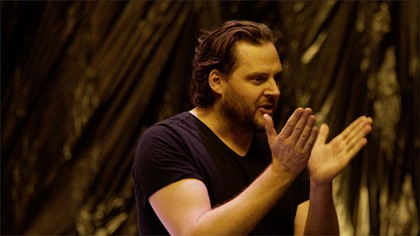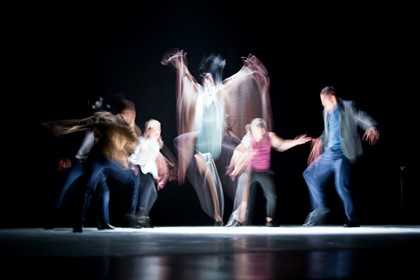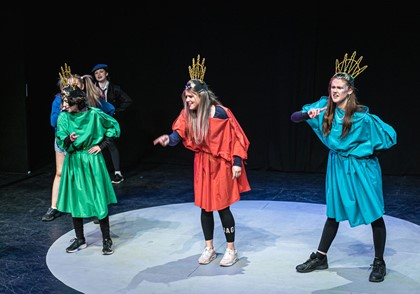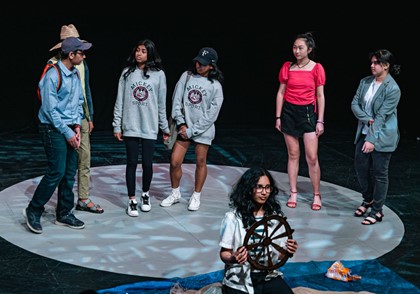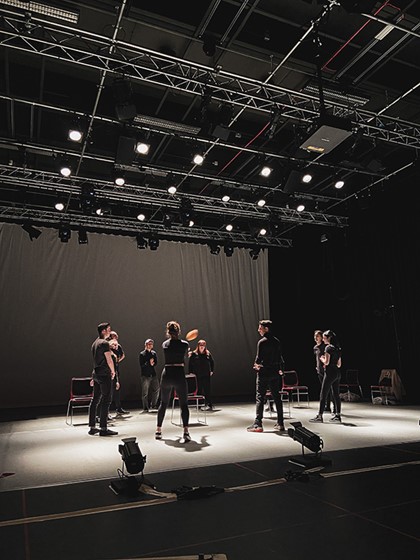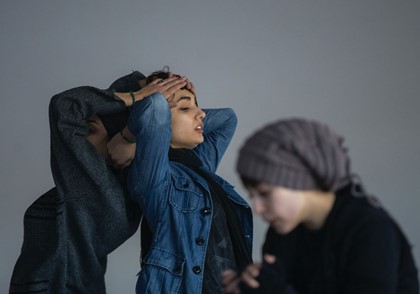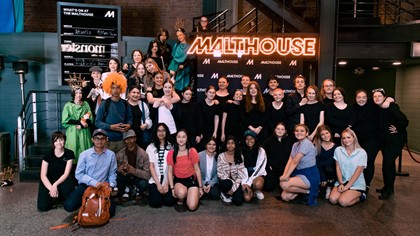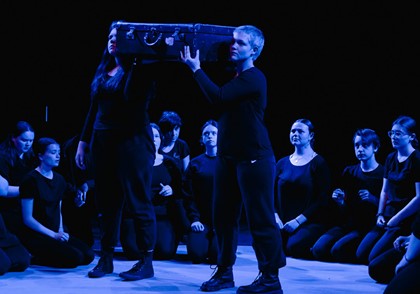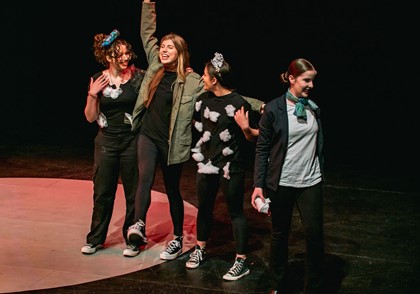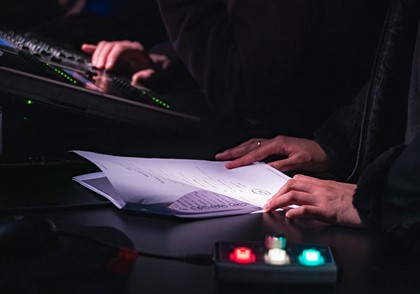One resource that can be shared widely – neither ‘trickled’ nor ‘down’ – is knowledge.
Education Coordinator Lyall Brooks examines education’s place in the performing arts sector – and imagines what it could be.
My role as Education Coordinator at Malthouse Theatre is to connect the work we already do with students’ learning, and to support them and their teachers by providing comprehensive dramaturgical and behind-the-scenes resources. We offer an annual, environmentally focused theatre-making program for Years 9 and 10 (the award-winning Suitcase Series) and leverages one or two productions a year for intensive study by Year 11 and 12 students as part of the official VCE Drama and Theatre Studies Playlist.
It's kind of like being a diplomat. I’m promoting our exceptional product, translating between languages, strategically sharing intelligence, and advocating for what mutually benefits our distinctive cultures – while respecting and celebrating that difference.
I don’t want to make Malthouse a school, and I’m not trying to turn schools into professional theatre companies. The goal is harmony, not homogeny.
The Arts is a complex and wonderful ecosystem – a diverse and interdependent network that, while inherently resilient, is only as robust or delicate as we nurture it to be. So where, and how, do arts organisations fit into the wider macro system – and how should Education fit into this?
These are my thoughts… I encourage you to agree, disagree, engage or ignore as you see fit – that’s why it’s called a provocation!
Major Organisations in the Sector
The disruptions the arts sector has faced over the past ten years (funding cuts, lockdowns, high-profile ethics interrogations, etc) could well be the shake-ups we needed to have. It certainly reminded many that every organism in our industry’s ecosystem – artists both emerging and established, schools, independent and small-to-medium companies, and the mainstage orgs – are essential and interdependent. Take away the krill and it will soon affect the health of the entire food chain, from whales to wood ducks to worms to wolves… and everything in between.
Without everybody working together to ensure we are all supported, the risk of artistic famine for our majors is palpable and our national artistic landscape risks becoming barren.
Education in the Sector
The ecosystem analogy gets uncomfortable when we equate its consumptive ‘foodchain’ model with a perceived inherent hierarchy in our industry.
So how do ensure a system that feels more ‘horizontal’? Where artists can feel a sense of creative and career progression, regardless of the direction we move?
If you’ve been paying attention to politics for the last thirty years you may realise that anything ‘trickle-down’ rarely works. Even when the resources poured into the ‘top’ are plentiful – which, in the performing arts, is just demonstrably not true. As an indie theatre practitioner myself, I realised long ago that major orgs will never have enough roles, money or opportunities for everyone to catch a leftover ‘trickle’ – nor should we subject ourselves to wanting or waiting for that.
One resource that can be shared widely – neither 'trickled' nor 'down' – is knowledge, and this can be done both within existing structures and also more broadly.
The cost and effort required for companies (of any size) to throw open their creative processes is minimal. How much does it take to have a young artist sit in on a rehearsal? Why don’t we open up the final reading in a development week to anyone interested in seeing how we create work?
In amongst the latest TikTok dances and soft marketing, can some of our social media posts feature the nuts and bolts of the rehearsal room or the writer’s process?
The effects of small actions like these can be profound – even when they’re invisible.
(Feedback in the arts is like the old saying about cockroaches: 'for every one you see, there are 99 more behind the nearest wall that you can’t'. You will never hear about 99% of the positive impacts we have when we share our knowledge and skills and processes. But they are felt.)
We often hear about creating ‘pathways’ for ‘emerging’ artists but, while an excellent idea, I would argue the terms themselves are an impediment to wider educational potential. Perhaps it’s time for the paradigm to be flipped: instead of providing young, ‘emerging’ artists an ordained career ‘pathway’ in the arts, consider that we are all on a continuum, constantly gaining knowledge and skills and forging our own multiple pathways as diverse as the industry – and the art – itself.
Education in Major Organisations
For those who now have me pegged as some sort of free-education-for-all altruist, this might come as a surprise:
I also believe arts orgs can take better advantage of their ability to monetise their educational offerings – and, in fact, they have an obligation to.
Let me explain.
(Firstly know this doesn’t minimise or negate the issue of accessibility – whether through price or other ways to lower barriers to entry – which is a separate, but equally vital, topic for another day.)
Drama in schools has always struggled to find a place at the leadership table, and education in theatre is the same. During Covid I noticed too many schools cutting their performing arts subjects – they were seen as too difficult, extraneous… disposable.
And I’ve seen education departments in arts companies around the world be similarly cut – with or without a pandemic.
Arguing the merits of arts education to the wider societal and industrial ecosystems, as I attempted earlier, is important. But for organisational education departments the battle is only half-fought if we don’t also show our benefits to the quantitive value-chain of a modern, vertically integrated company.
American arts business consultant Audrey Bergauer recommends placing Education within the ‘Revenue’ pillar of our arts orgs, creating hard value for the company in order to gain that seat at the table. If done successfully, we simultaneously increase capacity and resources to address things us education folk are also passionate about – like accessibility.
So how do we generate significant revenue (from those who are able to pay)? Bergauer suggests we could, and should, be asking:
'What aspects of performing arts education are not normally available through a theatre company? What components of the industry do our companies never normally touch?'
To answer these prompts, I believe we should reconsider all of our relationships in the performing arts industry, and envision how value can be exchanged with these potential stakeholders, i.e.:
- Drama students and their teachers;
- Primary, secondary or tertiary institutions;
- Private, public, and low-ICSEA schools;
- Artists, designers, directors, and writers;
- Production and stage management;
- Arts administrators;
- Independent and small-to-medium producers and companies;
- Other mainstage or commercial companies;
- Adults interested in drama or performance skills;
- Private tuition students;
- Audiences keen to see behind the scenes;
- Digital audiences; and
- Regional and remote audiences.
In conclusion, know that Education’s capacity in arts organisations is so much more holistic than just putting on a VCE Playlist show. It can play a vital role across the entire company (a ‘horizontal multiplier’ as Bergauer would say), and the effect it can have on people outside the org is incalculable.
There is an entire ecosystem out there that we need to nurture, and that will nourish us in return. Let’s keep tending it together.
What do you think? Do you agree or disagree? What have I missed? How aware are you of your (or your company’s) place in this wider system – and what do you do to support both your own and others’ practices? What actions could you take to change? What ideas do you already iterate that you can share with others?
Feel free to respond or provide feedback on this provocation by emailing engineroom@malthousetheatre.com.au
ABOUT THE AUTHOR
Lyall Brooks is the Education Coordinator at Malthouse Theatre. He has worked as a teaching artist for over two decades, and is also the founding artistic director of Australian new writing theatre company, Lab Kelpie.
